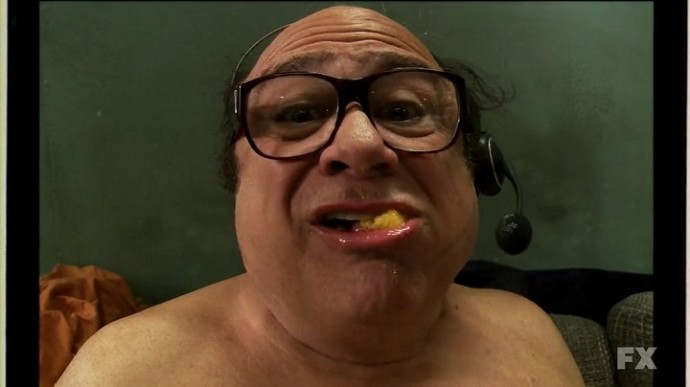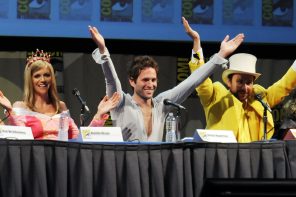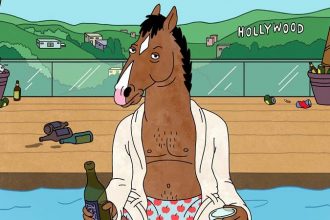By Jon Herlin
What has made It’s Always Sunny in Philadelphia great is that it’s a show about bad people. It revolves around a group of degenerate alcoholics known as ‘the gang’, who own and operate an unprofitable dive bar in Philadelphia called “Paddy’s Pub.” The gang is lazy, selfish, insecure, manipulative, petty, and abusive; on top of these endearing qualities, each member seems to have a combination of personality disorders from the DSM-V, the psychiatric diagnostic manual.
The most obvious example is Dennis, who, in one of the more recent seasons, was actually diagnosed with borderline personality disorder (“Psycho Pete Returns”). But even beforehand, there were numerous hints that something was wrong. To put it bluntly, it has long been implied that Dennis is a serial killer or a rapist. For example, he keeps a collection of “tools” such as zip ties in a secret compartment of the trunk of his car (“The High School Reunion Part 2: The Gang’s Revenge”). But even if Dennis is not a rapist in the legalistic sense, he is certainly an amoral scumbag who will stop at nothing to manipulate women into sleeping with him. For instance, in the now classic episode, “The D.E.N.N.I.S. System,” Dennis outlines his “foolproof” (that is, sociopathic) method of seduction; broken down step by step, the acronym stands for Demonstrate value, Engage physically, “Nurturing dependence”, Neglect emotionally, Inspire hope, and Separate entirely.
A lot of shows that start off edgy like It’s Always Sunny get safer as they go on, presumably so that they can appeal to a wider audience. The classic example is The Simpsons. In the first two or three seasons, the show was all attitude. It largely revolved around Bart, who, at the time, was an extremely risqué character, as hard as that may be to believe now. Bart was one of the first television characters to be unapologetically rebellious: “Eat my shorts,” he would yell, as he skateboarded away to avoid the fallout from his latest act of mischief. Bart achieved unprecedented popularity, and accordingly, parents across America lambasted the show’s creator Matt Groening for crafting such a terrible role model for their children. But after about ten seasons, The Simpsons started churning episodes out as formulaically as a farmer churns butter, and if you watch it now, you would never guess that it was ever considered transgressive.
That said, Always Sunny has largely taken the opposite approach: it has never been concerned with appealing to a wider audience; if anything, the show has gotten less mainstream and more esoteric as it has progressed. In fact, ‘the gang’ actually started out somewhat normal as far as sitcom characters go: Dennis was a douchebag without principals who would do anything to get laid; Mac was a fundamentalist Christian and a source of easy satire; Charlie was a loser who was always the butt of the joke; and Dee was the token woman, the voice of reason among irresponsible and misguided men.
The initial setup often led critics to compare the show to Seinfeld, and indeed, three out of four characters actually line up pretty well: Dennis with Jerry, Charlie with George, and Dee with Elaine. Everything changed, however, when the character Frank Reynolds (Danny DeVito) made his debut in Season 2. Originally, the premise was that Frank was Dennis and Dee’s father, and he wanted to reconnect with them; but his wackiness and lack of restraint corresponded with a drastic change in the show’s writing. The episodes’ plots were never tame, but after Frank was introduced, they escalated to absurdity. For example, in the episode in which Frank is introduced (“Charlie Gets Crippled”), Frank pretends to be a crippled Iraq War veteran in order to have sex with strippers. From season two onwards, the show genuinely became transgressive: it began to push the boundaries of the industry.
Over the seasons, the show has gradually revealed that Mac is a closet homosexual; however, it has consistently refused to resolve this plot piece.
Adding Frank to the main cast was one of the best decisions the show ever made. Though the four original characters continued to be broke, it no longer mattered because of Frank. He became the gang’s financier: his unspecified, and thereby unlimited, wealth became the legitimizer for the gang’s increasingly zany antics. That is, the writers essentially acquired unlimited creative license, because no matter how bad the gang could mess things up, it was always plausible that Frank would simply pay for things to return back to normal. Not to mention the fact that Frank, always the epitome of debauchery, is arguably the second funniest member of the gang—after Charlie, of course. One of the highlights of Season 11, in fact, is the episode “Being Frank,” which follows a day in the life of the gang from Frank’s perspective. On the one hand, the episode is hilarious because of all the crazy shit that Frank gets into; on the other hand, the episode is low-key poignant because it really shows how rapidly Frank is losing his mind in old age, how much he’s just hanging on for the ride.
When a show airs for a long time – especially ten seasons – it runs the risk of becoming tired. In one sense, that means that it runs the risk of becoming repetitive and boring, and many sitcoms have. How I Met Your Mother is the most recent example that I can think of, but most other sitcoms that start with an interesting premise filter it down over time to keep the show going. In another sense, “tired” means that the show started to become esoteric; it becomes sentimental, consumed with inside jokes, and no longer accomplishes what it once did. Friends is the classic example of this. The show became exclusively about the will-they-won’t-they around Ross and Rachel, even though everyone knew what was going to happen.
The last few seasons of Always Sunny have suffered from both of these problems. They had a sort of aimlessness to them, a sort of “where do we go now?”. The solution was to ramp up the inside jokes instead of breaking new ground. Effectively, the show became a caricature of itself as it refused to resolve any of the tensions that came up in the plot. Over the seasons, the show has gradually revealed that Mac is a closet homosexual; however, it has consistently refused to resolve this plot piece. Their point is that Mac is in denial, and indeed, this was fine for five seasons. Eventually, though, you have to go somewhere different with it or it becomes uninteresting—he can’t be in denial for the rest of the show. And in the two part finale of Season 11, “The Gang Goes to Hell”, Mac’s closet homosexuality is handled brilliantly. The episode takes place on a Christian cruise, and, upon seeing two men embrace, Mac begins to question the connection between God and (hetero)sexuality.
That said, Always Sunny has largely taken the opposite approach: it has never been concerned with appealing to a wider audience; if anything, the show has gotten less mainstream and more esoteric as it has progressed.
Season 11 manages to break new ground, to reinvigorate the show by moving forward. But at the same time, it’s very much a return to the show’s roots. The combination of these two factors makes it the strongest season in a while. It has the debauchery, it has the self-mockery, but best of all, it has the cutting cynicism that once established it as a countercultural phenomenon. There is no hugging. There are no lessons learned. There is only self-involvement, and in the depiction thereof, no subject matter is off limits for the writers, no matter how jarring or offensive it is. This is best captured by Dennis’ closing monologue from the season’s fourth episode, “Dee Made a Smut Film”:
“Is art good just because people say it’s good? Yes. Yes, that’s how it works. But keep in mind, a lot of modern art is trash. It’s shitty. It’s not good, it’s terrible…It makes it very difficult to determine what’s good art, what’s high art, what has worth and what has meaning. But if one thing has become abundantly clear to me today – and it should be clear to all of you, as well – it’s that I was not raped. It was consensual, we had a good time.”




